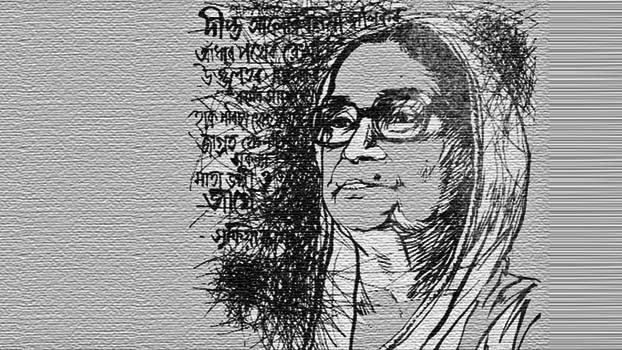The poet’s role in liberation war

Kamal showed her bravery several times. Once General Ayub Khan, the military ruler of Pakistan, at a meeting with social elites of Dhaka, commented that ordinary people are like beasts and as such, not fit to be given franchise. Sufia Kamal at once stood up and remarked, "If the people are beasts then as the President of the Republic, you are the king of the beasts
When the news of the 'killings' of Kamal and Dr Nilima Ibrahim by Pak Army after the crack down on 25 March 1971 was broadcast on Akashbani, a radio station of the Indian state West Bengal, it drew criticism internationally and countries across the world put diplomatic pressure on the then Pakistani military government for clarification. The Pakistani government was forced to broadcast an interview with the poet on radio only to prove that Sufia Kamal was still alive.[8]
Zillur Rahman, the then regional director of Radio East Pakistan, forwarded a paper to Kamal to sign with the statement "In 1971 no massacre took place in Bangladesh." When she refused, Rahman threatened, "If you don't give your signature then it might create a problem both for you and your son-in-law Kahar Chowdhury." She told him that she didn't care for her life. She said, "I would rather die than put my signature on the false statement. She actively but secretly helped freedom fighters of the Liberation War.
In 1971, several people in Dhaka including professor Ghyasuddin Ahmed and writer Shahidullah Kaiser collected medicine and food and delivered those to the posts of Sufia Kamal's house, from where the freedom fighters picked those up for their training outpost.[9] From July 1971, she used to go to the hospital with food and medicine for the injured people of war. At that time there was an acute crisis of food and medicine in the hospital. She used to give food and medicine to certain rickshaw pullers at the Science Laboratory, Dhaka. They would take the food and medicine to the freedom fighters. She was able to establish closer contact with the freedom fighters such as Abul Barak Alvi, Shafi Imam Rumi, Masud Sadek Chullu and Jewel in August.
As the Pakistani army kept their strong watch on her, she would try to help the freedom fighters in different ways ignoring the risks. Except Abul Barak Alvi, all others died in the hand of the Pakistani Army.[8] The Pakistan Army and their collaborators killed Sufia Kamal's son-in-law, Kahar Chowdhury, because they were very angry with her. Early December 1971 Shahidullah Kaiser, Munier Chowdhury and Fazle Rabbi cautioned her to leave Dhaka but they themselves did not leave and got caught and later got killed.[8]
Since liberation, Sufia Kamal also initiated and led many other organisations, at both governmental and non-governmental levels. She was the founding-chairperson of the following organisations: The Bangladesh Women's Rehabilitation Board, Bangladesh Rural Advancement Committee, Dustha Punarbasan Sangstha (Organisation for the Rehabilitation of the Destitutes). She was the president of chhayanaut, a major cultural organisation, Bangladesh Protibondhi Foundation, a foundation for the treatment, education and rehabilitation of the handicapped, and Nari Kalyan Sangstha, which has published a number of Begum Roquiah's books, among its various activities.
Celebrated Poems of Sufia Kamal
1. Rajanigandha
2. Love-Timid
3. Taharey Pode Mone
4. He Mahan Neta
5. That Love Of Yours
6. Shajher Maya
7. Ajikar Shishu
8. Hemonto
9. Jonmechi Ei Deshe
10. Cchoton Ghumai
11. Itol Bitol
12. Prarthona
13. Bashonti
14. Mitate Jothor Khudha
15. Kaaler Jatrar Dhoni
16. Poth Nohe Onontohin



